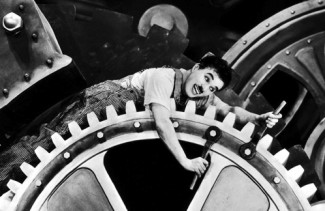Charlie Chaplin is working on an assembly line. He tightens bolts with a pair of wrenches. He does this without stop, over and over, for hours on end. The repetitive motion drives him temporarily mad – the machine takes over the man. He leaves the factory with the wrenches still in his hands, trying to “tighten” everything in sight that looks like a pair of bolts, including the buttons on the breasts of a woman’s dress. That invasion of the machine into him is like what happens when, by accident, he is sucked into the works of the machine, and we see the little mustachioed fellow cranked this way and that as he is caught between the thing’s gigantic gears and cables.
Perhaps the people who run our schools should check out a copy of Modern Times, and consider the nifty Billows Feeding Machine, to which Charlie is strapped for automatic lunch, with mechanical arms to give him his soup and wipe his mouth. The genius of the Billows Feeding Machine is efficiency. Why should the human cog take thirty minutes for lunch when he can take ten? That’s twenty minutes saved for work, and time is money. Students who have an hour for their lunch hour rather than a few rushed minutes for their lunch hour may get into trouble, it’s often said, at which one throws his hands up in despair and cries, “Better human trouble than inhuman order!” About that trouble and its causes I’ll have more to say in a future essay.
But back to the Billows Teaching Machine – the school. We are so accustomed to its ways that we can scarcely imagine any alternative. Children must be segregated by age. Why? Is that natural? Do all children learn the same things at the same time and the same rate? Uniformity is the product of a machine, not of a living organism, much less the living spiritual being called man. Children must be hustled from room to room, or from subject to subject, at the ringing of a bell. Why? Do all subjects that merit study fit neatly into forty-two minute cubbyholes? What if a child’s interest in the subject is just then beginning to kindle? Doesn’t that matter? What if it just takes longer to read a chapter of Treasure Island? Should the child have to curtail the reading in mid-event – as if freezing the characters in place?
I know, I know, I am a college professor, I too meet my students at a certain time, for an hour, and then time is up (though we don’t have bells, and though, late in the afternoon, I’ll often ask my students to stick around a little longer). We take it all for granted. Why? And the always somewhat arbitrary division of the day into subjects – why?
Homeschoolers know what I am getting at here. When Socrates and Phaedrus were sitting under the plane tree on the country road from Athens, no alarm rang on the old man’s watch to tell him it was time to move from moral philosophy to metaphysics. “Sorry, Phaedrus, but your time is up” – no one can imagine Socrates saying such a thing. When Jesus sat upon the hillside and taught the crowds, he and they were so taken up into meditation upon the kingdom of God that they lost all sense of time, and soon the sun was setting and – well, unless you are a reader of The New York Times or a graduate of Harvard you know the rest of the story. When, in Paradise Lost, Adam and Eve are sitting in the cool of the evening, recalling when they first met and praising the goodness of God, Eve expresses a joy that teachers and students should know, but rarely have the chance to know:
With thee conversing I forget all time,
All seasons and their change, all please alike.
That was, of course, when people measured their works according to the place of the sun, and the state of the weather; the whole world was their time. That whole world had not yet been concentrated into the electric clicks of a machine on a wall.
The chief lesson that the bell teaches is that all things must serve a utilitarian purpose. I recall reading in The Princeton Alumni Weekly, an insufferable publication of my alma mater, about how a woman managed time with her small boy. He was allowed to approach the Presence between three and three-thirty, but then he had to leave, because Mummy had important work to do, evidently far more important than was the small boy. But also more important than Mummy herself. The bell says, “Nothing is of ultimate concern, because all things end when I determine.” There are only two reasons why one would study a thing that is not of ultimate concern, or that does not bring that delight that carries us out of ourselves, as experiences of love and beauty do. One is that it is useful, a means to a farther end. The other is that we have no choice. We are compelled to do it. And since the experience of love or of beauty is by its nature impossible to compel, any justification for the compulsion must rest on utilitarian grounds. But that reduces education to a tool, and a tool which is often of dubious quality.
That is right and just, since the children themselves are tools of dubious quality. They are called our greatest resource, like a deposit of tin. They are treated as advance troops in the remaking of the human material known as their parents. They are educated, not as persons made in the image and likeness of the living God, but as pawns in a vast sociopolitical game; they too are not valued in themselves and for themselves, but for what they will accomplish. They will be rewarded according to how well they adapt themselves to the Teaching Machine, whose judgments are at once lax (for the Machine does not actually teach a great lot) and severe (for the judgments enter the Book of Life, with implications for college and employment thereafter, worldliness without end).
How does the Machine mechanize? More on this to come.








8 comments
Chris Travers
One more link on this is http://www.youtube.com/watch?v=VucczIg98Gw
Pete Seeger singling Tom Paxton’s “What did you learn in school today?”
Seemed appropriate.
Tony Esolen
Dear John: Fair enough … But a couple of things.
First: you must stop using that word “masses”. There is no education for the masses. There is only education for the human beings among whom you find yourself. I propose absolutely no solution that will work equally well in Brooklyn as in East Podunk, because there is no such.
Second: you must fight against the inhumanity of the institution into which you have been placed. That means you have to own up to the existence of that inhumanity, the extent to which it is both parasitic upon family breakdown and a catalyst of that breakdown; its core nihilism, which is softened into relativism, and which is death to the soul; and its displacement of what is true and good and beautiful with what is politically expedient.
Third: you must understand that your allies in this fight are the great novelists and poets and artists of the past, and your enemies are pretty much everybody else. Frost is your ally; all of the swill that makes its way into the textbooks because it is politically “relevant” is your enemy. The good book is your ally. The computer is your enemy. Anything natural and beautiful is an ally; the bus, the rushed lunch hour, the manifold indignities endemic to the very structure of the school day, the inanities of the bell, the herding of students, all of these are enemies….
John
I agree with much of what you say. How, then, do we provide this kind of education for the masses? This is of course how things should be, but how do we bring them about, living as we do on this side of the Fall?
We certainly need some form of schools, don’t you agree? And those schools require logistical processes in order to manage that many people – especially young people. We need some form of order as much as we need traffic lights and stop signs, and for this order we will necessarily sacrifice some of our ideal educational situation. What changes do you propose?
– Energetic public school teacher, concerned for the poor in our schools and searching for the best way to help them through education
Chris Travers
Watched Modern Times with the kids last night, but they asked me what “nose powder” was.
The movie is deep and thought provoking. I wonder to some extent whether the sort of nervous breakdown portrayed in the movie was relatively common or at least people understood what has become known as the Tetris Effect in the age of video games.
I think one other thing that the Tetris Effect reminds us is how much the things we do all the time shape our views of reality.
Jon S.
Prof. Esolen,
My young niece has just started kindergarten this fall. I asked her a few weeks ago what she is learning and she said, “How to get in line and how to be quiet.” I immediately thought of your “10 Ways to Destroy…” book. My niece has learned early the most important lessons of American industrial education: shut up and get in line. Thank you for these essays as they reinforce my conviction to home school my children to the limits of my wife’s and my abilities.
Briana
Modern Times is an excellent movie! And this is an excellent article! Well done! 🙂
Chris Travers
I found this to be an incredibly thought-provoking essay. The ultimate question is, what do we do about the way we have mechanized our society? I think the first step is coming up with a different way of thinking.
I wrote down some thoughts as to what lead me away from the Great Machine metaphor and towards a Great Ecosystem metaphor. Maybe folks here will find them interesting. Th
Albert
The writer shares some similar observations with Salman Khan, but what of the alternatives?
Comments are closed.